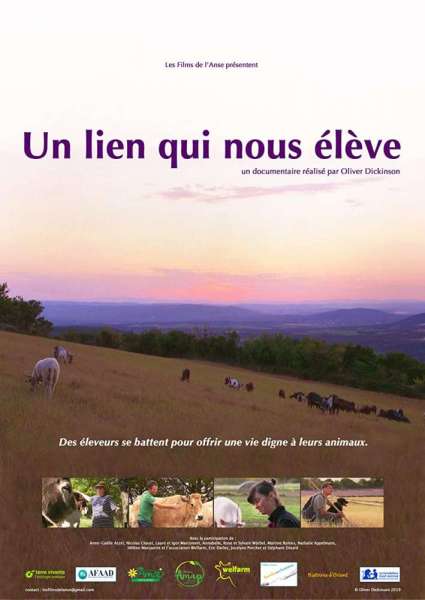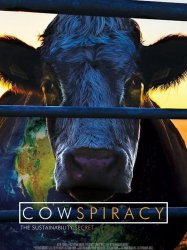Un lien qui nous élève is a french film of genre Documentary
Un lien qui nous élève (2019)

If you like this film, let us know!
OriginFrance
Genres Documentary
Un lien qui nous élève est un film documentaire français réalisé par Oliver Dickinson, sorti en 2019.
Synopsis
Des éleveurs se battent pour offrir une vie digne à leurs animaux...Comments
Leave comment :
Suggestions of similar film to Un lien qui nous élève
There are 8965 with the same cinematographic genres, 1500 films with the same themes (including 1 films with the same 6 themes than Un lien qui nous élève), to have finally 70 suggestions of similar films.If you liked Un lien qui nous élève, you will probably like those similar films :

Des locaux très motivés (2016)
, 1h18Origin France
Genres Documentary
Themes Environmental films, Films about the labor movement, Documentary films about environmental issues, Documentaire sur la société humaine, Documentaire sur le monde paysan, Documentaire sur le monde du travail, Documentary films about nature
Caplongue, village aveyronnais de 80 habitants, a vu naître en 2012 l’association des Loco-Motivés. Son ambition est de produire et consommer local dans le respect de la nature, des animaux et des personnes, de la manière la plus conviviale possible. Au travers de portraits intimistes et poétiques, nous suivrons pendant douze mois dans le Lévézou l’engagement d’Isabelle, Jean-Marc, Vincent et les autres autour de cette grande idée.
 , 1h30
, 1h30Origin France
Genres Documentary
Themes Environmental films, Films about the labor movement, Documentary films about environmental issues, Documentaire sur la société humaine, Documentaire sur le monde paysan, Documentaire sur le monde du travail
Le Larzac aujourd'hui, avec ses habitants au caractère bien trempé, ses paysages magnifiques et ses brebis. Tableau subjectif d'un lieu unique, fortement marqué par les luttes des années 70, une terre reconquise à l'armée, où les paysans d'alors et de nouveaux venus continuent à se battre pour une agriculture saine et un monde meilleur...
 , 1h52
, 1h52Directed by Jean-Paul Jaud
Origin France
Genres Documentary
Themes Cooking films, Environmental films, Films about the labor movement, Documentaire sur la cuisine, Documentary films about business, Documentary films about environmental issues, Documentaire sur la malbouffe, Documentary films about health care, Documentaire sur le monde du travail, Documentary films about nature
Rating67%





Our Children Will Accuse Us tells the story of an initiative in Barjac, a commune located in the Gard department in southern France, that decided to introduce organic produce into the town's school cafeteria. The film depicts without concessions the environmental tragedy which threatens the young generation: the poisoning of our country sides by agricultural pesticides (76 000 tons of pesticides used each year in France) and the harm caused to public health and safety.
 , 1h31
, 1h31Origin USA
Genres Documentary
Themes Films about animals, Environmental films, Politique, Films about the labor movement, Documentary films about business, Documentary films about animal rights, Documentaire animalier, Documentary films about law, Documentary films about environmental issues, Documentaire sur le monde du travail, Political films, Documentary films about nature
Rating80%





Cowspiracy est un documentaire d'importance majeure. Controversé, il se penche sur l'impact de l'élevage sur l'environnement. Kip Andersen, producteur et directeur du film, révèle des informations exclusives portant sur les politiques de groupes environnementaux comme Greenpeace, Sierra Club, Surfrider Foundation, and Rainforest Action Network en plus de statistiques alarmantes sur les impacts que génèrent la consommation de viande.

Leader-Sheep (2011)
, 2hDirected by Christian Rouaud
Origin France
Genres Documentary
Themes Environmental films, Films about the labor movement, Documentary films about environmental issues, Documentaire sur la société humaine, Documentaire sur le monde paysan, Documentaire sur le monde du travail
Rating71%





Ce documentaire retrace, de 1970 à 1981, dans le cadre immense du haut plateau du Larzac, Aveyron (Massif central) mais aussi dans la ville de Paris, les onze années de luttes non violentes et inventives menées par les paysans et paysannes du lieu contre leur expropriation au profit du projet de l'époque d'agrandir le camp d'entraînement militaire du Larzac. Ces hommes et ces femmes de la micro-société paysanne conservatrice et catholique française de l'époque se virent avec étonnement et parfois un peu de crainte épaulés par des dizaines de milliers de personnes qui, pour certaines, ont depuis fait souche dans ce pays en s'installant comme agriculteurs.

Bovines (2012)
Directed by Emmanuel Gras
Origin France
Genres Documentary
Themes Films about animals, Environmental films, Films about the labor movement, Documentaire animalier, Documentary films about environmental issues, Documentaire sur le monde du travail, Films about cows, Documentary films about nature, Mise en scène d'un mammifère
Rating66%





Film documentaire sur la vie des vaches, dans leur champ, sous la pluie, au soleil...

Cursed for Gold (2008)
, 1h33Directed by Olivier Weber
Origin France
Genres Documentary
Themes Environmental films, La mondialisation, Films about the labor movement, Documentary films about business, Documentaire sur l'altermondialisme, Documentary films about environmental issues, Documentaire sur le monde du travail, Documentary films about nature, L'Or

Blood of the Beasts (1949)
, 21minutesDirected by Georges Franju
Origin France
Genres Documentary, Horror
Themes Films about animals, Environmental films, Politique, Films about the labor movement, Documentary films about animal rights, Documentaire animalier, Documentary films about law, Documentary films about environmental issues, Documentaire sur le monde du travail, Political films, Documentary films about nature
Actors Georges Hubert, Nicole Ladmiral
Rating76%





Franju's film contrasts peaceful scenes of Parisian suburbia with scenes from a slaughterhouse. The film documents the slaughtering and butchering of horses, cattle, and sheep. The film is narrated without emotive language.

The Light Bulb Conspiracy (2010)
, 1h15Genres Documentary
Themes Environmental films, La mondialisation, Films about the labor movement, Documentary films about business, Documentaire sur l'altermondialisme, Documentary films about environmental issues, Documentary films about historical events, Documentary films about technology, Documentaire sur le monde du travail
Actors Casey Neistat
Rating79%





Un historique de cette stratégie commerciale et industrielle visant à limiter la durée de vie de certains produits ou appareils est relaté à travers plusieurs exemples particulièrement significatifs.

Voices of Transition (2012)
, 1h5Origin France
Genres Documentary
Themes Environmental films, La mondialisation, Films about the labor movement, Documentary films about business, Documentary films about environmental issues, Documentary films about technology, Documentaire sur le monde du travail, Disaster films
Rating75%





Using interviews and overlays of graphics and text, the film presents the current problems facing industrial agriculture. It explores why in the interviewees' view the current industrial model is not up to the task of feeding the world's people. According to the film every calorie of energy contained in a food source currently takes between 10 and 20 calories of crude oil in the production of fertilizers and transportation to produce, leading to a strong dependence of the cost of food on oil prices. As a result of peak oil and increasing oil prices this dependence will lead to ever increasing food prices. According to the film, this dependence already represents a significant weak-spot in the global food supply chain. Additionally, agriculture is already responsible for 40% of greenhouse gas emissions, contributing to climate change. Furthermore, the film argues that the overuse of inorganic fertilizers has been responsible for the loss of soil fertility and threatens the complete loss of usable soil within the next decades through soil erosion and sinking crop yields. These effects, according to the film, can only be partly mitigated by the increased use of those same fertilizers. The loss of workplaces, the concentration of land in the hands of a few (allegedly a farm closes every 23 minutes in France) as well as the dependence on large corporations are enumerated as side effects of the industrialisation of agriculture since the 1920s. Companies, such as Monsanto and Bayer, control everything from seed stock to fertilizers and the necessary chemical mixes for hybrid plants, thereby controlling the entire supply chain. The film argues that this development was supported through subsidies from the World Bank. Interviews with Vandana Shiva, the founder of the Transition Towns movement Rob Hopkins and various agricultural experts serve to argue this viewpoint. The dependence on crude oil is illustrated through the example of the wholesale food market in Rungis.
 Connection
Connection